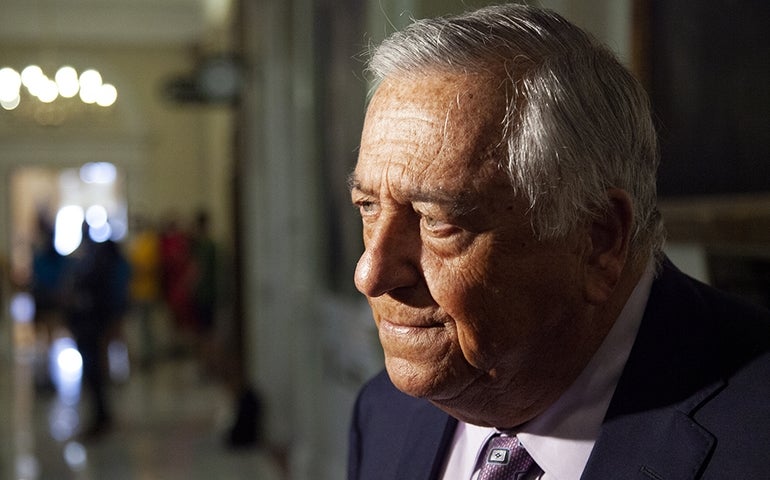House Speaker Ron Mariano offered more evidence Thursday that lawmakers are eyeing ways to support the state’s stretched-thin early education and child care workforce and to wrangle sky-high costs that continue to burden families.
And to Greater Boston Chamber of Commerce President and CEO Jim Rooney, Mariano’s remarks in a speech before the group also contained a “somewhat subtle call to action to the business community” to be part of the funding solution.
“I think it was wise of you to pick that gem out,” Mariano replied during a Q&A with Rooney after his speech at the Colonnade Hotel.
The speaker recounted a meeting with former Education Committee Co-chair Rep. Alice Peisch, who is now an assistant majority leader, after she helped lead a special commission that last year called for sweeping changes to the early education and care sector that would cost “upwards of $1.5 billion annually over time.”
“When Alice presented her plan and everyone saw the price tag, I think we all were a little taken aback when we realized how much we would have to put into this to get it up to where we want it to be,” Mariano said. “We need help, and we still need help.”
In their inaugural speeches kicking off the session, Mariano and Senate President Karen Spilka flagged early education and care as an area where they will direct significant focus.
The Senate in July approved a bill aimed at expanding access to subsidized child care, strengthening the workforce pipeline and creating a permanent framework for provider stabilization grants that have proven valuable in recent years. The House never advanced the measure for a vote.
As he warned that Beacon Hill “need[s] help” to tackle the issue, Mariano described a resource strain that cuts across other areas: the end of pandemic-era heightened federal aid.
“I don’t think federal funding is going to be going up any time soon unless you live in the Ukraine. We’re looking at tightening up on our federal resources that we’ve received, and we’re going to have to do this on our own,” Mariano told business leaders. “We can’t, as a body, step in and fill every time they cut a federal program. We can’t replace it at the levels that we were getting federal money.”
Lawmakers and Gov. Maura Healey agreed to fund three more months of heightened food aid after the federal government ended a Supplemental Nutrition Assistance Program (SNAP) enhancement, and they have also kept a universal school meals program in place once federal dollars dried up.
The House’s upcoming fiscal 2024 budget bill would make the free meals program permanent, Mariano said Thursday, while Healey filed a separate spending bill to fund it for another year.
“We’re going into this very strange economic situation where inflation may or may not be out of control, I don’t know. I watch the financial news like everyone else, but I don’t know if it’s going up or down or sideways. But it is an issue, and it’s got me concerned,” Mariano said.
Another risk, Mariano said, is the prospect of Massachusetts losing its frontrunner standing in the growing offshore wind industry.
“Having been once probably the leader of the East Coast, we’re now competing with New Jersey and New York,” Mariano told Chamber members. “If we have to compete, we have to really step up and be all-in.”
Several offshore wind developments are already in the pipeline and lawmakers have authorized more capacity that has not yet been procured. Another round of procurement will be required this year under existing law.
While the state is under pressure to advance its clean energy agenda, Mariano said he wants to see action to add “escalators and de-escalators” into the procurements “so if you’re having trouble getting stuff, you can push the date back.”
“I think we’ve got to be a little creative. We have to send the message, because New Jersey has got some good ideas and they’re making progress, and I think that’s our competition right now,” he told reporters. “The New York application is so complicated. We heard from a number of folks that they can’t even figure out how to apply for some of the procurements out there. But I do think that it’s a message that we should want to make, and the industry wants us to do this because they know that we have probably the best stretch on our coast.”
Reviving a push for one of his priority issues last session, Mariano said he wants lawmakers to act to subject hospitals to more scrutiny when they seek to expand into smaller markets with community hospitals.
He also called for action to strengthen the Health Policy Commission, particularly to allow the cost-containment regulators to focus on the pharmaceutical industry and the role it plays in driving overall health care spending.
“We never factored them into the evaluation of hospital finances,” Mariano said. “We missed the boat.”
Mariano said he wants to ensure the HPC’s staff have the “relevant professional experiences to help the state meet the challenges of our current health landscape,” stressing during his Q&A that he does not want to be “critical of anyone’s performance” but instead equip the commission with more tools.
The HPC itself has called for lawmakers to update its governing statute by giving the commission more teeth to enforce cost containment efforts and the ability to subject industry groups to greater scrutiny.

